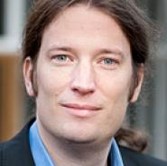4EU+ online seminars on "Artificial Intelligence Techniques, Applications, and Social Issues"
1, 2, 3: Convolutional Neural Networks for semantic segmentation
8 April 2021
16:00 – 17:30 CET
Link to online seminars: Zoom
Abstract
U-Nets are fully convolutional neural networks known for their excellent performance in image segmentation. This talk discusses U-Nets for semantic segmentation of 1-, 2- and 3-dimensional data with application examples from remote sensing and medical data analysis. A general, lightweight system for efficient and accurate 3D image segmentation is discussed. It requires no task-specific information, almost no human interaction and is based on a fixed neural network topology and a fixed hyperparameter set, eliminating the need for model selection and its inherent tendency to cause overfitting. The talk also presents U-Time, a feed-forward network for physiological time series segmentation developed for the analysis of sleep data. U-Time maps sequential inputs of arbitrary length to sequences of class labels on a freely chosen temporal scale. The presented systems are available open source and do not require deep learning expertise to use.
Short bio
Christian Igel is a professor at DIKU, the Department of Computer Science at the University of Copenhagen (UCPH). He studied Computer Science at the Technical University of Dortmund, Germany. In 2002, he received his Doctoral degree from the Faculty of Technology, Bielefeld University, Germany, and in 2010 his Habilitation degree from the Department of Electrical Engineering and Information Sciences, Ruhr-University Bochum (RUB), Germany. From 2003 to 2010, he was a Juniorprofessor for Optimization of Adaptive Systems at the Institute for Neural Computation, RUB. In October 2010, He was appointed professor with special duties in machine learning at DIKU. Since December 2014 he is a full professor at DIKU. He is director of the SCIENCE AI Centre at UCPH.
Christian Igel is a Fellow of ELLIS, European Lab for Learning and Intelligent System. Among others, he serves as an Editor of the German Journal on Artificial Intelligence (KI) and an Associate Editor of the Evolutionary Computation Journal (ECJ) and the Artificial Intelligence Journal (AIJ).
